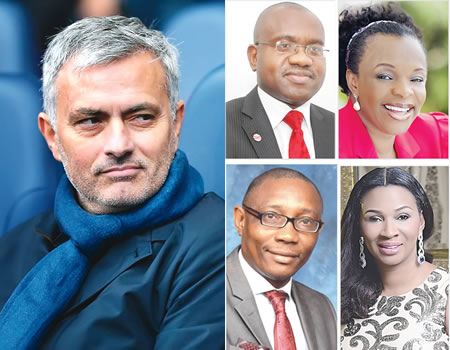A leader is never in want of advisers. When there is an issue, everyone who has access to the leader wants to express their view on the matter. While it is best that a leader should not deafen his ears to wise counsels, it is not every suggestion made by others that should arrest the leader’s attention let alone warrant a change of course. Although many of the counsels offered the leader are borne out of good intention, more often than not, they are not products of great reflections. Counsels that are not in line with the ultimate goal of a leader are mere distractions, paying attention to them will result in the leader ending up where he never intended. Many people are given to sentiments and emotions; they are driven more by the urgent than the important and these impair their thinking process, but a leader cannot afford to travel that route. A leader must never allow emotion to dominate him or becloud his reasoning to the extent of determining his actions. A leader must have a firm understanding of what he wants to accomplish and pursue same with strong determination, otherwise he will experience derailment.
Irrespective of the number of advisers assembled by a leader, he has the final call. The leader has the full picture of what has to be done, the advisers may not be privy to this. It is the leader’s responsibility to proffer solution, not that of those angling to advise him. It is the leader who will account for the success or otherwise of the organization he leads, not his many counselors. Therefore, a leader must be smart enough to distinguish between a counsel with the propensity to propel him towards the realization of his goals and those with the likelihood of impeding his progress and vitiating his success so that he will be able to make use of the essential and let go of the trivial.
The Mourinho magic
Jose Mourinho was kicked out of Chelsea Football Club of England mid-season in 2016 following repeated below the par performance of his players but he was picked up at the end of that season by the management of Manchester United Football Club to shore up the sliding fortune of the club. Shortly after signing up with Man United, he won the Community Shield. He later followed up on that with the English Football League (EFL) Cup. Although the club’s performance in the 2016/2017 English Premier League was not all that satisfactory, it was doing quite well in the UEFA Europa League to the extent of getting to the finals. When the club was preparing for the final match with Ajax Amsterdam and was sixth on the EPL table, it had to play a match with Arsenal Club. Winning this match against Arsenal could shore up its fortune on the local league table and position it to finish as the fourth in the league, which would earn it a place in the UEFA Champions League in 2017/2018. Mourinho weighed his options and decided not to feature his best hands (legs) in the match against Arsenal, preferring to keep his best for the Europa League final against the advice of many of the club’s supporters. His team ended up losing 0-2 to Arsenal; it was also Mourinho’s first loss to Arsene Wenger, Arsenal’s coach. Many of the supporters of Manchester United blamed Mourinho for the loss, saying the coach should have put his best foot forward for that match.
But Mourinho was justified on May 24, 2017 at the Friends Arena in Solna, Sweden, when Manchester United defeated Ajax by 2-0 to secure the club’s first title in UEFA Europa League. With that victory, Mourinho led Manchester United to join a very small group of clubs that have won all the three major European trophies (European Champion Clubs’ Cup/UEFA Champions League, UEFA Cup/Europa League, and the now defunct UEFA Cup Winners’ Cup).
By winning the Europa League title, Manchester United earned itself a place in the group stage of the 2017–18 UEFA Champions League as the position reserved for the Champions League title holders would not be used because winners of the 2017 UEFA Champions League, Real Madrid, had already secured a spot in the group stage of the 2017–18 UEFA Champions League via its league victory.
So, Mourinho, like a good General, discountenanced the counsels of those who did not see what he saw, decided on the battles he was willing to trade off so that he could win the all-important war.
How leaders avoid counsel-generated distractions
Counselors are needed no doubt, but not all counsels are useful because many of those milling around the leader are goaded by personal interests which are the rationale behind the counsels offered. Wrong counsels have destroyed and derailed many leaders. So, the onus is on every leader to develop a strategy for distinguishing between counsels to be considered and those meant for the garbage bin. These are some of the steps to take.
Start with a well-thought out vision
Vision is always the starting point because it provides the compass that guides into the future. Every leadership engagement is a journey; without a vision, the leader will be lost in the ensuing labyrinth. But with a vision he will be guided through the maze and led to the desired end. Great leadership is never perfunctory; it is always deliberate. So, the vision must not be one that is handed down to the leader or one that he picked up on the journey; it must be one which is a product of reflection by the leader and his teammates after considering a myriad of factors. The vision must be challenging enough to keep the leader on his toes and must be promising enough to stimulate consistent pursuit.
So, to consider a counsel, the leader must view it vis-à-vis his vision. Will it take him closer to the realization of his vision or take him off his course? This will lead him into taking a decision on what to do with the counsel.
Map out your strategy carefully
As good as visions are they don’t have self-fulfilling powers; they have to be worked out. The way to work out a vision is to get a strategy to drive it. Strategies are the wings on which visions fly. Without a good strategy, a vision will fall flat on its face. So, a leader must always come up with strategies to drive the vision. When a leader has failed to come up with a strategy of his own and has also failed to lead his team to generate one, any suggestion, no matter how ineffectual, will appear godsend.
Pursue your vision with vigour
Advisers and naysayers are encouraged to air their views when they perceive a lull in the pursuit of a vision, but when the leader is gung-ho about his mission and gives it the whole of himself, they hold back their counsels. Therefore, a leader must never fail to go about the pursuit of his vision with great vigour. Apart from stilling every negative view, it also energizes those working with the leader because it sends a message to them that the leader believes in what he is doing. Nothing wins others over into a venture better than having a leader who is perceived to be sold completely on it.
Decide early on your trade offs
One distinguishing feature of great Generals is not that they know they cannot win every battle if they want to win the war but that they determine far ahead the battles they are willing to lose so that they can win the big war. Success is almost impossible without tradeoffs. Therefore, every leader must decide early enough on the defeats he is willing to concede so that he can concentrate on more important issues that will define his leadership and devote the bulk of his resources towards achieving those ones. The tradeoffs cannot be left to advisers to determine; they are issues that the leader has to personally decide.
Be a person of strong conviction
The undoing of many leaders is their failure to stick to their original plans; they change their positions at the drop of a hat. Leaders who do this are unable to distinguish between what is important and what is urgent. In leadership, there will always be urgent matters that will require immediate attention but these should not cause a detour from what is important. Legacies are built by focusing on the important things while organizations are run by executing urgent actions. Every leader must decide whether he wants to be remembered just for running an organization or for building a legacy. It is only a person of strong conviction that will insist on going ahead with doing the important things when the heat of the urgent is burning. But without paying attention to the important things, the leader will look back later to realize that he has been involved in motion without movement and activity without productivity.
Last line
In the final analysis, it is the leader’s call and he carries the can for his actions and inactions. So, he should not put himself at the mercy of everyone who offers a suggestion or espouses an opinion.






